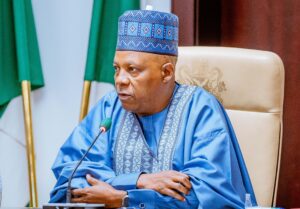
Expert proffers solution to transport infrastructure challenges in Nigeria
By Matthew Denis
An expert, Engr. Dr. Mudasiru Bola has suggested headways toward achieving lasting remedies to transport infrastructure challenges in Nigeria such as investing more in resilient transport infrastructures, promoting electronic mobility etc.
He stressed this will lead to unlocking Nigeria’s economic growth and improve the standard of living with the opportunity of enhancing connectivity, increase access to markets and services.
Dr. Mudasiru who is the National Secretary General of the Nigerian Institution of Highway and Transportation Engineers (NIHTE) made the submission of Dr. Mudasiru Bola, the at the 2024 Annual General Meeting (AGM) and inauguration ceremony of Engr. Ismail Olasunkanmi Olatinwa as third Chairman of the Ibadan chapter recently.
Speaking on the topic; Resilient Transportation Infrastructure, Best practice for Urban and Rural Mobility’. He pinpointed out that Investment in resilient transport infrastructure, Develop integrated public transportation systems, promote electric mobility and sustainable transport and to foster intergovernmental cooperation and private sector participation are solutions that will place Nigeria and Africa at large on the global map in this sector.
The expert said Resilient transportation infrastructure is crucial for urban and rural mobility, ensuring safe, efficient, and sustainable movement of people and goods in Nigeria, aligning with Sustainable Development Goals (SDGs).
He explained that Urban Mobility has the components of Integrated Public Transportation Systems (IPTS): Combine rail, bus, and bike-sharing, Smart Traffic Management: Real-time monitoring and optimization., Pedestrian-Friendly Infrastructure: Walkable streets, pedestrianized zones, Cycling Infrastructure: Dedicated bike lanes, bike-sharing, Green Spaces: Parks, green roofs, and urban gardens.
Breaking the topics down, he argued “Rural Mobility entices Rural Road Connectivity, which has to do with Improve access to healthcare, education, and markets.Public Transportation: Regular bus services, community transport.Non-Motorized Transport: Walking and cycling infrastructure.
Accessibility: Inclusive design for people with disabilities.Technology Integration: Mobile apps for transportation information.
Resilient transportation infrastructure is vital for enhancing urban and rural mobility in Nigeria, where the majority of passenger and freight movement relies
heavily on road networks. The country’s transport system faces significant challenges, including inadequate and poorly maintained roads, particularly in
rural areas, which hampers agricultural productivity and socio-economic development, overreliance on road networks for passenger and freight movement.
Approximately 95 percent of
agricultural freight is transported by road, yet only about 30% of rural roads are all-season, leading to severe accessibility issues for rural communities.Moreover, the promotion of electric mobility is emerging as a
key opportunity for sustainable transport solutions in both Urban and rural settings. Investments in electric vehicles and associated infrastructure are seen as essential for reducing
emissions and fostering climate-resilient development.
The Engineer expert summoned that best practices for resilient transportation infrastructure in Nigeria involve a comprehensive approach that integrates infrastructure investment, policy development, community engagement, and innovative technologies to ensure equitable access and sustainable mobility for all citizens.
“As engineers, policymakers, and stakeholders, we must
collaborate to develop context-specific solutions for Nigeria’s transport infrastructure.To integrate climate resilience and inclusivity into transport planning.Foster innovative technologies and sustainable transport
solutions. Promote community engagement and participation. Together, we can create a more sustainable, equitable, and climate-resilient transport infrastructure for Nigeria, aligning with global SDG targets.
He emphasized that sustainable Funding Models for Resilient Transportation lies on Public-Private Partnerships that’s Collaborating with the private sector to leverage expertise, resources, and innovative financing for transportation projects.
Another area is User-Based Funding which is implementing sustainable revenue sources, such as
fuel taxes, vehicle miles traveled fees, and congestion pricing, to align with usage and environmental impact.
Also, innovative financing implies exploring alternative funding mechanisms, like green bonds, federal grant programs, and impact investment models, to secure long-term resources for transportation infrastructure.
Dr. Mudasiru recommended prioritizing rural road development and maintenance, promoting electric mobility and associated infrastructure, enhancing public transport systems, focusing on vulnerable populations, investments in electric vehicles and infrastructure, reducing emissions, and foster climate-resilient development.
He pointed out that the country’s transportation network plays a vital role in facilitating urban and rural mobility, economic growth, and socio-economic
development, but inadequate road networks, particularly in rural areas, pose significant challenges.
“The country needs an additional 200,000km of roads to be among the 20 top developed countries in the world as quoted by Former Director-General of NBRRI, Prof. Danladi Matawal, 2020. To address these challenges, a comprehensive approach is necessary,
incorporating: Resilient infrastructure investment. Sustainable transport policy development, community engagement, and participation.
“Aligning with the United Nations Sustainable Development Goals (SDGs), specifically SDG 9, 11, 13, 5, 10, and 1, emphasizes the importance of developing resilient infrastructure. Delivering safe, affordable, accessible, and sustainable transport systems.”




